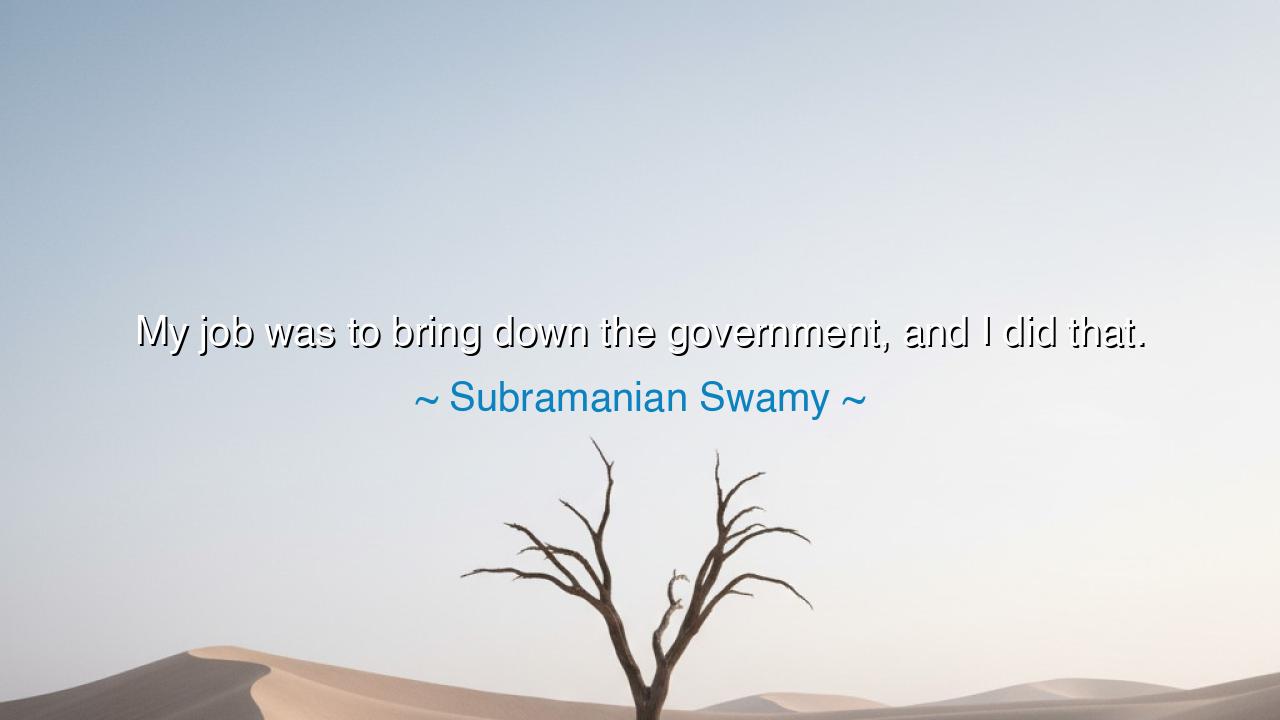
My job was to bring down the government, and I did that.






Hear, O seekers of courage and cunning, the words of Subramanian Swamy, who once declared with unwavering confidence: “My job was to bring down the government, and I did that.” In this statement lies not merely the boast of a man of politics, but the essence of purpose, strategy, and fearless conviction. It is the voice of one who understood that in times of corruption or stagnation, the duty of a patriot is not to preserve comfort but to upend the unjust order, to shatter complacency so that a nation may breathe anew.
The origin of these words is rooted in the turbulent world of Indian politics, where Swamy—an economist, parliamentarian, and reformer—became known for his relentless pursuit of accountability. When he spoke these words, he was referring to his pivotal role in destabilizing a ruling government mired in scandal and controversy. His declaration was not born of malice, but of moral defiance. To him, the act of “bringing down the government” was not destruction for destruction’s sake—it was the surgical act of cleansing a body poisoned by corruption. In his view, it was not rebellion, but restoration.
Swamy’s words recall the ancient truth that every society must sometimes be shaken to survive. When power grows arrogant and unaccountable, when leaders place themselves above the law, the hand of justice must strike—even if it means tearing down the walls of the very institution it serves. History is filled with such moments, when individuals stood against empires and regimes not because they desired chaos, but because they desired renewal. Swamy’s act mirrors that of those who understood that destruction can be the first act of creation, that one must sometimes demolish the old edifice to lay the foundation for a cleaner order.
Consider the tale of Lucius Junius Brutus, who in ancient Rome rose against King Tarquin the Proud, the last of Rome’s monarchs. Brutus, though once loyal to the crown, saw tyranny consuming his people. In a moment of fierce resolution, he led a revolt that ended the monarchy and birthed the Roman Republic, a new system grounded in shared governance and the rule of law. Like Swamy, Brutus acted not from ambition but from duty—his task was clear, his will unshaken. Both men understood that to oppose corruption is to risk everything, but to do nothing is to betray one’s nation.
But Swamy’s statement also carries a warning. The act of “bringing down” power must be guided by principle, not vengeance. To destroy without purpose is mere anarchy; to overthrow for self-interest is tyranny reborn. True reformers strike not from hatred, but from a fierce love for justice and truth. Swamy’s words remind us that when one undertakes such a mission, one must be ready to stand alone—to endure criticism, hostility, and isolation—for the path of righteous opposition is always a lonely one.
The lesson, therefore, is clear: to serve truth is to challenge power when it strays from virtue. Whether in governance, community, or the quiet corners of personal life, there are moments when integrity demands defiance. One must learn to distinguish loyalty to a cause from loyalty to corruption, and to act with courage even when the cost is great. Swamy’s triumph lay not merely in the fall of a government, but in his unwavering belief that no power, however mighty, stands above accountability.
Thus, his words echo through the ages as both a challenge and a command—to leaders, to citizens, and to all who wield influence: dare to confront injustice when it wears the mask of authority. For history belongs not to those who obey without question, but to those who stand firm in truth, even when the world calls them rebels. Like the heroes of old, Subramanian Swamy reminds us that the highest duty of a citizen is not to serve the powerful, but to serve the nation’s conscience.






AAdministratorAdministrator
Welcome, honored guests. Please leave a comment, we will respond soon